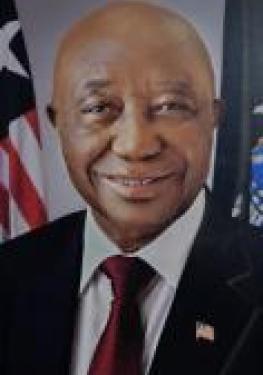The Environmental Protection Agency of Liberia (EPA) recently concluded a two-day intensive training for about 40 Liberian Journalists from various outlets across the country on how to adequately report the Rio Conventions and other environmental issues in Liberia.
There are three Rio Conventions including the Convention on Biodiversity, the Convention on Climate Change and the Convention on Desertification. They derived from the 1992 Earth Summit. The three Rio Conventions represent a way of contributing to the sustainable development goals of Agenda 21.
The training was bankrolled by the Global Environment Facility (GEF) under the Cross Cutting Capacity Development (CCCD) Project, which seeks to improve Liberia’s capacity to make better decisions to meet and sustain global obligations especially those pertaining to the Rio Conventions.
This requires the country to have the capacity to coordinate efforts, as well as best practices for integrating global environmental priorities into planning, decision-making, and reporting processes.
Aaron Wesseh, CCCD Project Manager said the CCCD project is in line with GEF-6 CCCD strategic objectives.
He disclosed that the workshop sought to increase Rio Conventions awareness and improve the capacity of media professionals.
Wesseh noted that the training was expected among other things, to create a pool of journalists dedicated to effectively cover the Rio Conventions.
United Nations Development Program (UNDP) Representative, Willie Davies extended greetings from UNDP Resident Representative, Dr. Pa Lamin Beyai who could not be present at the start of the training due to ‘pressing engagement’.
Davies underscored the importance of the training noting “it was expected to enhance the understanding of media practitioners in order to inform their reporting on the Rio Conventions.”
He also added that the workshop was supported by the Global Environment Facility (GEF).
Speaking on behalf of EPA Deputy Executive Director, Randall M. Dobayou, J. S. Datuamah Cammue highlighted the importance of sustainable development and the need to protect the environment.
He mentioned four kinds of international development, environment and decision making being keys among them.
Mr. Cammue further emphasized that the role of the media in environmental activities is critical.
He urged participants to be involving and attentive during the training as environmental reporting is essential.
Cammue noted that media education in Liberia is a challenge; notwithstanding, efforts are being exerted through initiatives such as “this training to educate the media on environmental matter.”
Buttressing Cammue’s statement, Jerome Nyenka, Lead facilitator at the training applauded the media for their efforts in reporting environmental issues.
According to Prof. Nyenka, despite the limited environmental educational opportunity, the media has exerted brilliancy in reporting environmental issues.
He singled out the efforts of two journalists, who according to him have reported environmental degradation on the Lofa River in Grand Cape Mount County and beaches in Monrovia, respectively.
Nyenka also shared the experience of the media’s role in the UN peace keeping operations in Liberia and how the country has evolved over the years with women playing key leadership roles.
Jefferson P. Dahn, one of the facilitators said Liberia is a signatory to the Rio Convention and disclosed that there are more than 250 multilateral environmental agreements (MEAs).
According to him, Liberia is a party to some of the multilateral environmental agreements including the UNCCD, United Nations Framework Convention on Climate Change (UNFCCC)
Presenting on ‘Environmental Terminologies common to the Rio Conventions,’ Dahn explained the concept of greenhouse gases and its effect.
He also provided education on the polluter pay principle (PPP), climate change mitigation, and climate change adaptation.
Dahn told journalists that environmental management is everyone’s business and called on them to use their various outlets to educate residents about environmental issues.
Speaking on the origin of the Rio Conventions, Dr. Kolleh Bangura admonished journalists, who are basically not environmentalists, to be simple when reporting the environment.
He said the conventions came into being due to global concerns about environmental degradation, forest lost and the encroachment on deserts.
Dr. Bangura disclosed that in 1992 United Nations Conference on Environment and Development (UNCED), also known as the Earth Summit was held and moved theory toward action.
“It was a program to further the goal of sustainable development in an effort to lessen human impact on the natural environment, while simultaneously addressing social issues such as, health and consumption,” he noted.
According to him, the objective of UNFCCC is to stabilize greenhouse gas concentrations in the atmosphere at a level that would prevent dangerous anthropogenic interference with the climate system.
“The framework sets non-binding limits on greenhouse gas emissions for individual countries and contains no enforcement mechanisms. It outlines how specific international treaties called “protocols” or “agreements” may be negotiated to specify further action towards the objectives of the UNFCCC,” he added.
For his part, facilitator Emmanuel Peters in a powerpoint presentation on ‘Introduction to UNFCCC (How climate change impact socio-economic development)’ provided a historical timeline of sustainable development beginning from the Stocholm convention in 1972 , Brundland Report – 1987, Rio De Janeiro – 1992 (first Earth Summit), Johannesburg – 2002 (second Earth Summit), up to Rio De Janeiro – 2012 (Third Earth summit).
He also shed light on key agreements and protocols such as the Kyoto protocol and outlined critical issues in carbon emission and the need to lower carbon foot prints of nations especially Annex 1 countries.
Berexford Jallah spoke on desertification and its global impact and disclosed that the UNCCD is the only instrument on land.
Jallah said that 64% of the World’s dry land is in Africa and Asia and disclosed that every year Africa loses about 280 million tons of cereal crops from about 105 million hectares f croplands.
“Poverty-related agricultural practices including overgrazing, fire etc are major factors causing desertification,” he added.
Miss Tenema Coleman’s presentation highlighted that biodiversity is the variety of living organisms within specified geographic region.
The environment, according to her, refers to surroundings or space where human, animals and plant live.
“The Rio Earth Summit in 1992 in Brazil sets legal framework for the conservation of biological diversity, the sustainable use of its components and the fair and equitable benefit sharing arising from the commercial utilization of genetic resources and it related traditional knowledge,” Miss Coleman added.
She spoke of the EPA responsibility to regulate and ensure the protection of biodiversity and noted that there is a critical need to adhere to the seven basic principles of ecotourism.
Coleman also noted that infrastructure need assessment is a must and Environmental Social Impact Assessment (ESIA) in is inevitable in projects that has the propensity to impact the environment.
J. S. Datuamah Cammue presenting on ‘How to report the Rio Conventions as lead stories on radio, TV and front pages of news papers’ and said the media ability is to inform and educate.
According to him, the media can play advocacy role and as well as a conduit for dialogue to resolve situation.
He told the gathering that environment reporting is a special art that can be learned and noted that the main task of a journalist is to help people understand what is happening around them; in their village, in their country and world.
Environmental issues, Cammue noted are highly scientific and reporters dealing with it should have special skills like scientific background.
Cammue drilled journalists through key theories and concepts including the conventional and advocacy roles of the media.
Following the close of the training, journalists attending the workshop entered a memorandum of agreement preventing activities that may cause adverse impacts on the surrounding ecosystems; build awareness amongst the communities that parties interact with on the benefits of managing landscapes in line with the Rio Conventions;
Document and share specialized knowledge between different parties; and accelerate practical action for implementation of the Rio Conventions.
Speaking on behalf of participants, journalist Kimberlyn McKeiver of Liberia News Agency (LINA) extended thanks to the EPA and UNDP for making the program a success.
She called on EPA and UNDP to include them in further training both locally and internationally and pledged commitment for the implementation of the agreement.
In additional remark, Journalist Joseph Charlie of New Liberia Newspaper commended EPA and UNDP and urged the EPA to be consistent in selecting participants to attend environmental training so as to achieve desired results.



